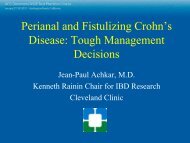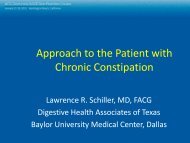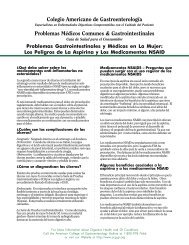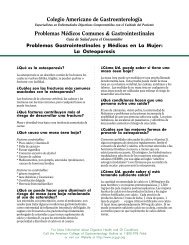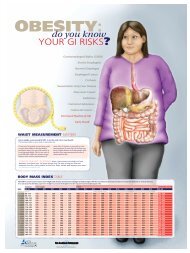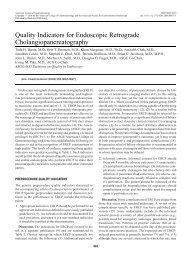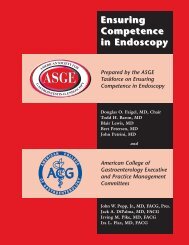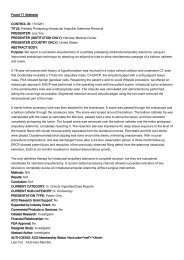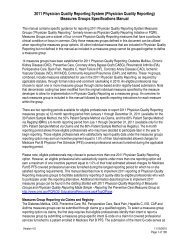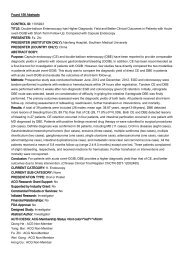Pregnancy
Pregnancy
Pregnancy
You also want an ePaper? Increase the reach of your titles
YUMPU automatically turns print PDFs into web optimized ePapers that Google loves.
Constipation, Diarrhea, Hemorrhoids and Fecal Incontinence<br />
Jennifer A. Christie, M.D. & Suzanne Rose, M.D., FACG<br />
Mount Sinai School of Medicine<br />
Jennifer A. Christie, M.D.<br />
Adjunct Assistant Professor<br />
Division of Gastroenterology<br />
Mount Sinai School of Medicine<br />
Suzanne Rose, M.D., FACG<br />
Professor, Medical Education<br />
Professor, Medicine<br />
Division of Gastroenterology<br />
Mount Sinai School of Medicine<br />
Pregnant women are susceptible<br />
to a host of bowel disturbances<br />
such as constipation, diarrhea,<br />
and fecal incontinence at rates<br />
similar to that of the general population.<br />
However, there is data to suggest<br />
that the pathophysiology of the alteration<br />
in bowel pattern may be specific<br />
to hormonal and structural changes that<br />
occur during pregnancy and as a result<br />
of delivery. In this section, we will discuss<br />
how the physiologic changes that<br />
occur during pregnancy may contribute<br />
to the development of specific bowel<br />
disturbances. In addition, we will address<br />
therapy for these conditions with<br />
special consideration for maternal and<br />
fetal safety.<br />
Constipation<br />
Constipation defined as 1) straining at<br />
defecation at more than 25% of bowel<br />
movements 2) hard stool at more than<br />
25% of bowel movements, and 3) two or<br />
fewer movements a week is thought to<br />
occur in 1/3 of women in their third trimester.<br />
1 However, in another study only<br />
1.5 % of pregnant constipated women<br />
required laxatives. 2<br />
The etiology of constipation during<br />
pregnancy is multi-factorial (Table 1).<br />
The hormonal changes that occur during<br />
pregnancy, such as increased progesterone<br />
and estrogen, and decreased motilin<br />
have not been well studied in humans.<br />
However, pregnant rats were found to<br />
have prolonged colonic transit compared<br />
to nonpregnant or oviarectomy<br />
controls. 1 In dogs, progesterone has been<br />
shown to reduce the contractile force of<br />
both circular and longitudinally oriented<br />
strips of smooth muscle in vitro. 3 These<br />
effects were found to be mediated by cytoplasmic<br />
Ca 2+ concentration. There are<br />
no studies on colonic transit in pregnant<br />
women. However, there are a few studies<br />
looking at the effect of sex hormones<br />
on colonic transit. Women were found<br />
to have slightly slower colonic transit<br />
than men, yet no significant difference<br />
was found. The effect of the menstrual<br />
cycle on colonic transit suggests that female<br />
sex hormones modestly affect colonic<br />
transit. 4<br />
The approach to management of constipation<br />
in pregnancy is similar to that<br />
of the general population. Commonly,<br />
constipation is managed primarily by<br />
dietary and behavioral modification. Dietary<br />
changes include increasing water<br />
(>8 glasses/day) and fiber intake (20-35<br />
grams/day). Bulk laxatives, psyllium<br />
and methylcellulose, are safe and effective<br />
in pregnancy. 1 Osmotic laxatives<br />
such as polyethylene glycol (PEG) (8-25<br />
gms/day) and lactulose (15-30 cc/day)<br />
stimulate fluid accumulation in the gut.<br />
Consequently, PEG has been found to<br />
...................................................................................................................................................................................



